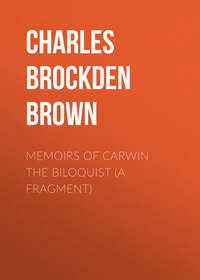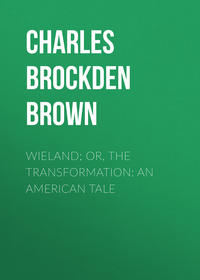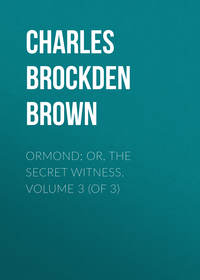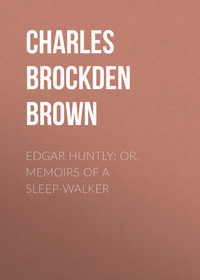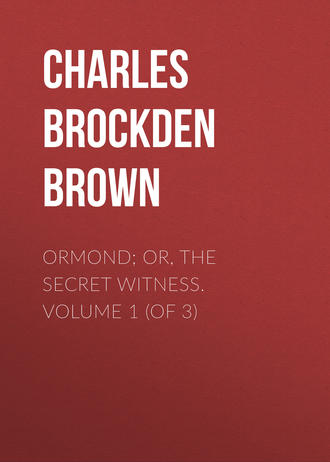 полная версия
полная версияOrmond; Or, The Secret Witness. Volume 1 (of 3)
At a few yards' distance from the fence, and within it, some one appeared to have been digging. An opening was made in the ground, but it was shallow and irregular. The implement which seemed to have been used was nothing more than a fire-shovel, for one of these he observed lying near the spot. The lady had withdrawn from the door, though without closing it. He had leisure, therefore, to attend to this new circumstance, and to reflect upon the purpose for which this opening might have been designed.
Death is familiar to the apprehensions of a soldier. Baxter had assisted at the hasty interment of thousands, the victims of the sword or of pestilence. Whether it was because this theatre of human calamity was new to him, and death, in order to be viewed with his ancient unconcern, must be accompanied in the ancient manner, with halberts and tents, certain it is, that Baxter was irresolute and timid in every thing that respected the yellow fever. The circumstances of the time suggested, that this was a grave, to which some victim of this disease was to be consigned. His teeth chattered when he reflected how near he might now be to the source of infection: yet his curiosity retained him at his post.
He fixed his eyes once more upon the door. In a short time the lady again appeared at it. She was in a stooping posture, and appeared to be dragging something along the floor. His blood ran cold at this spectacle. His fear instantly figured to itself a corpse, livid and contagious. Still he had no power to move. The lady's strength, enfeebled as it was by grief, and perhaps by the absence of nourishment, seemed scarcely adequate to the task which she had assigned herself.
Her burden, whatever it was, was closely wrapped in a sheet. She drew it forward a few paces, then desisted, and seated herself on the ground apparently to recruit her strength, and give vent to the agony of her thoughts in sighs. Her tears were either exhausted or refused to flow, for none were shed by her. Presently she resumed her undertaking. Baxter's horror increased in proportion as she drew nearer to the spot where he stood; and yet it seemed as if some fascination had forbidden him to recede.
At length the burden was drawn to the side of the opening in the earth. Here it seemed as if the mournful task was finished. She threw herself once more upon the earth. Her senses seemed for a time to have forsaken her. She sat buried in reverie, her eyes scarcely open, and fixed upon the ground, and every feature set to the genuine expression of sorrow. Some disorder, occasioned by the circumstance of dragging, now took place in the vestment of what he had rightly predicted to be a dead body. The veil by accident was drawn aside, and exhibited, to the startled eye of Baxter, the pale and ghastly visage of the unhappy Monrose.
This incident determined him. Every joint in his frame trembled, and he hastily withdrew from the fence. His first motion in doing this produced a noise by which the lady was alarmed; she suddenly threw her eyes upward, and gained a full view of Baxter's extraordinary countenance, just before it disappeared. She manifested her terror by a piercing shriek. Baxter did not stay to mark her subsequent conduct, to confirm or to dissipate her fears, but retired in confusion to his own house.
Hitherto his caution had availed him. He had carefully avoided all employments and places from which he imagined imminent danger was to be dreaded. Now, through his own inadvertency, he had rushed, as he believed, into the jaws of the pest. His senses had not been assailed by any noisome effluvia. This was no implausible ground for imagining that his death had some other cause than the yellow fever. This circumstance did not occur to Baxter. He had been told that Frenchmen were not susceptible of this contagion. He had hitherto believed this assertion, but now regarded it as having been fully confuted. He forgot that Frenchmen were undoubtedly mortal, and that there was no impossibility in Monrose's dying, even at this time, of a malady different from that which prevailed.
Before morning he began to feel very unpleasant symptoms. He related his late adventure to his wife. She endeavoured, by what argument her slender ingenuity suggested, to quiet his apprehensions, but in vain. He hourly grew worse, and as soon as it was light, dispatched his wife for a physician. On interrogating this messenger, the physician obtained information of last night's occurrences, and this being communicated to one of the dispensers of the public charity, they proceeded, early in the morning, to Monrose's house. It was closed as usual. They knocked and called, but no one answered. They examined every avenue to the dwelling, but none of them were accessible. They passed into the garden, and observed, on the spot marked out by Baxter, a heap of earth. A very slight exertion was sufficient to remove it, and discover the body of the unfortunate exile beneath.
After unsuccessfully trying various expedients for entering the house, they deemed themselves authorised to break the door. They entered, ascended the staircase, and searched every apartment in the house, but no human being was discoverable. The furniture was wretched and scanty, but there was no proof that Monrose had fallen a victim to the reigning disease. It was certain that the lady had disappeared. It was inconceivable whither she had gone.
Baxter suffered a long period of sickness. The prevailing malady appeared upon him in its severest form. His strength of constitution, and the careful attendance of his wife, were insufficient to rescue him from the grave. His case may be quoted as an example of the force of imagination. He had probably already received, through the medium of the air, or by contact of which he was not conscious, the seeds of this disease. They might have perhaps have lain dormant, had not this panic occurred to endow them with activity.
CHAPTER VIII
Such were the facts circumstantially communicated by Sarah. They afforded to Constantia a theme of ardent meditation. The similitude between her own destiny and that of this unhappy exile could not fail to be observed. Immersed in poverty, friendless, burdened with the maintenance and nurture of her father, their circumstances were nearly parallel. The catastrophe of her tale was the subject of endless but unsatisfactory conjecture.
She had disappeared between the flight of Baxter and the dawn of day. What path had she taken? Was she now alive? Was she still an inhabitant of this city? Perhaps there was a coincidence of taste as well as fortunes between them. The only friend that Constantia ever enjoyed, congenial with her in principles, sex, and age, was at a distance that forbade communication. She imagined that Ursula Monrose would prove worthy of her love, and felt unspeakable regret at the improbability of their ever meeting.
Meanwhile the dominion of cold began to be felt, and the contagious fever entirely disappeared. The return of health was hailed with rapture by all ranks of people. The streets were once more busy and frequented. The sensation of present security seemed to shut out from all hearts the memory of recent disasters. Public entertainments were thronged with auditors. A new theatre had lately been constructed, and a company of English Comedians had arrived during the prevalence of the malady. They now began their exhibitions, and their audiences were overflowing.
Such is the motley and ambiguous condition of human society, such is the complexity of all effects, from what cause soever they spring, that none can tell whether this destructive pestilence was on, the whole, productive of most pain or most pleasure. Those who had been sick and had recovered found in this circumstance a source of exultation. Others made haste by new marriages to supply the place of wives, husbands, and children, whom the scarcely-extinguished pestilence had swept away.
Constantia, however, was permitted to take no share in the general festivity. Such was the colour of her fate, that the yellow fever, by affording her a respite from toil, supplying leisure for the acquisition of a useful branch of knowledge, and leading her to the discovery of a cheaper, more simple, and more wholesome method of subsistence, had been friendly, instead of adverse to her happiness. Its disappearance, instead of relieving her from suffering, was the signal for the approach of new cares.
Of her ancient customers, some were dead, and others were slow in resuming their ancient habitations, and their ordinary habits. Meanwhile two wants were now created and were urgent. The season demanded a supply of fuel, and her rent had accumulated beyond her power to discharge. M'Crea no sooner returned from the country than he applied to her for payment. Some proprietors, guided by humanity, had remitted their dues, but M'Crea was not one of these. According to his own representation, no man was poorer than himself, and the punctual payment of all that was owing to him was no more than sufficient to afford him a scanty subsistence.
He was aware of the indigence of the Dudleys, and was therefore extremely importunate for payment, and could scarcely be prevailed upon to allow them the interval of a day for the discovery of expedients. This day was passed by Constantia in fruitless anxieties. The ensuing evening had been fixed for a repetition of his visit. The hour arrived, but her invention was exhausted in vain. M'Crea was punctual to the minute. Constantia was allowed no option. She merely declared that the money demanded she had not to give, nor could she foresee any period at which her inability would be less than it then was.
These declarations were heard by her visitant with marks of unspeakable vexation. He did not fail to expatiate on the equity of his demands, the moderation and forbearance he had hitherto shown, notwithstanding the extreme urgency of his own wants, and the inflexible rigour with which he had been treated by his creditors. This rhetoric was merely the prelude to an intimation that he must avail himself of any lawful means, by which he might gain possession of his own.
This insinuation was fully comprehended by Constantia, but it was heard without any new emotions. Her knowledge of her landlord's character taught her to expect but one consequence. He paused to observe what effect would be produced by this indirect menace. She answered, without any change of tone, that the loss of habitation and furniture, however inconvenient at this season, must be patiently endured. If it were to be prevented only by the payment of money, its prevention was impossible.
M'Crea renewed his regrets that there should be no other alternative. The law sanctioned his claims, and justice to his family, which was already large, and likely to increase, required that they should not be relinquished; yet such was the mildness of his temper and his aversion to proceed to this extremity, that he was willing to dispense with immediate payment on two conditions. First, that they should leave his house within a week, and secondly, that they should put into his hands some trinket or movable, equal in value to the sum demanded, which should be kept by him as a pledge.
This last hint suggested an expedient for obviating the present distress. The lute with which Mr. Dudley was accustomed to solace his solitude was, if possible, more essential to his happiness than shelter or food. To his daughter it possessed little direct power to please. It was inestimable merely for her father's sake. Its intrinsic value was at least equal to the sum due, but to part with it was to bereave him of a good which nothing else could supply. Besides, not being a popular and saleable instrument, it would probably be contemptuously rejected by the ignorance and avarice of M'Crea.
There was another article in her possession of some value in traffic, and of a kind which M'Crea was far more likely to accept. It was the miniature portrait of her friend, executed by a German artist, and set in gold. This image was a precious though imperfect substitute for sympathy and intercourse with the original. Habit had made this picture a source of a species of idolatry. Its power over her sensations was similar to that possessed by a beautiful Madonna over the heart of a juvenile enthusiast. It was the mother of the only devotion which her education had taught her to consider as beneficial or true.
She perceived the necessity of parting with it, on this occasion, with the utmost clearness, but this necessity was thought upon with indescribable repugnance. It seemed as if she had not thoroughly conceived the extent of her calamity till now. It seemed as if she could have endured the loss of eyes with less reluctance than the loss of this inestimable relic. Bitter were the tears which she shed over it as she took it from her bosom, and consigned it to those rapacious hands that were stretched out to receive it. She derived some little consolation from the promises of this man, that he would keep it safely till she was able to redeem it.
The other condition – that of immediate removal from the house – seemed at first sight impracticable. Some reflection, however, showed her that the change might not only be possible but useful. Among other expedients for diminishing expense, that of limiting her furniture and dwelling to the cheapest standard had often occurred. She now remembered that the house occupied by Monrose was tenantless; that its antiquity, its remote and unpleasant situation, and its small dimensions, might induce M'Crea, to whom it belonged, to let it at a much lower price than that which he now exacted. M'Crea would have been better pleased if her choice had fallen on a different house; but he had powerful though sordid reasons for desiring the possession of this tenement. He assented therefore to her proposal, provided her removal took place without delay.
In the present state of her funds this removal was impossible. Mere shelter would not suffice during this inclement season. Without fuel, neither cold could be excluded, nor hunger relieved. There was nothing convertible into money but her lute. No sacrifice was more painful, but an irresistible necessity demanded it.
Her interview with M'Crea took place while her father was absent from the room. On his return she related what had happened, and urged the necessity of parting with his favourite instrument. He listened to her tale with a sigh. "Yes," said he, "do what thou wilt, my child. It is unlikely that any one will purchase it. It is certain that no one will give for it what I gave; but thou may'st try.
"It has been to me a faithful friend. I know not how I should have lived without it. Its notes have cheered me with the sweet remembrances of old times. It was, in some degree, a substitute for the eyes which I have lost; but now let it go, and perform for me perhaps the dearest of its services. It may help us to sustain the severities of this season."
There was no room for delay. She immediately set out in search of a purchaser. Such a one was most likely to be found in the keeper of a musical repository, who had lately arrived from Europe. She entertained but slight hopes that an instrument scarcely known among her neighbours would be bought at any price, however inconsiderable.
She found the keeper of the shop engaged in conversation with a lady, whose person and face instantly arrested the attention of Constantia. A less sagacious observer would have eyed the stranger with indifference. But Constantia was ever busy in interpreting the language of features and looks. Her sphere of observation had been narrow, but her habits of examining, comparing, and deducing, had thoroughly exhausted that sphere. These habits were eminently strong with relation to this class of objects. She delighted to investigate the human countenance, and treasured up numberless conclusions as to the coincidence between mental and external qualities.
She had often been forcibly struck by forms that were accidentally seen, and which abounded with this species of mute expression. They conveyed at a single glance what could not be imparted by volumes. The features and shape sunk, as it were, into perfect harmony with sentiments and passions. Every atom of the frame was pregnant with significance. In some, nothing was remarkable but this power of the outward figure to exhibit the internal sentiments. In others, the intelligence thus unveiled was remarkable for its heterogeneous or energetic qualities; for its tendency to fill her heart with veneration or abhorrence, or to involve her in endless perplexities.
The accuracy and vividness with which pictures of this kind presented themselves to her imagination resembled the operations of a sixth sense. It cannot be doubted, however, that much was owing to the enthusiastic tenor of her own conceptions, and that her conviction of the truth of the picture principally flowed from the distinctness and strength of its hues.
The figure which she now examined was small, but of exquisite proportions. Her complexion testified the influence of a torrid sun; but the darkness veiled, without obscuring, the glowing tints of her cheek. The shade was remarkably deep; but a deeper still was required to become incompatible with beauty. Her features were irregular, but defects of symmetry were amply supplied by eyes that anticipated speech and positions which conveyed that to which language was inadequate.
It was not the chief tendency of her appearance to seduce or to melt. Hers were the polished cheek and the mutability of muscle, which belong to woman, but the genius conspicuous in her aspect was heroic and contemplative. The female was absorbed, so to speak, in the rational creature, and the emotions most apt to be excited in the gazer partook less of love than of reverence.
Such is the portrait of this stranger, delineated by Constantia. I copy it with greater willingness, because, if we substitute a nobler stature, and a complexion less uniform and delicate, it is suited with the utmost accuracy to herself. She was probably unconscious of this resemblance; but this circumstance may be supposed to influence her in discovering such attractive properties in a form thus vaguely seen. These impressions, permanent and cogent as they were, were gained at a single glance. The purpose which led her thither was too momentous to be long excluded.
"Why," said the master of the shop, "this is lucky. Here is a lady who has just been inquiring for an instrument of this kind. Perhaps the one you have will suit her. If you will bring it to me, I will examine it, and, if it is complete, will make a bargain with you." He then turned to the lady who had first entered, and a short dialogue in French ensued between them. The man repeated his assurances to Constantia, who, promising to hasten back with the instrument, took her leave. The lute, in its structure and ornaments, has rarely been surpassed. When scrutinised by this artist it proved to be complete, and the price demanded for it was readily given.
By this means the Dudleys were enabled to change their habitation, and to supply themselves with fuel. To obviate future exigences, Constantia betook herself once more to the needle. They persisted in the use of their simple fare, and endeavoured to contract their wants, and methodize their occupations, by a standard as rigid as possible. She had not relinquished her design of adopting a new and more liberal profession, but though, when indistinctly and generally considered, it seemed easily effected, yet the first steps which it would be proper to take did not clearly or readily suggest themselves. For the present she was contented to pursue the beaten track, but was prepared to benefit by any occasion that time might furnish, suitable to the execution of her plan.
CHAPTER IX
It may be asked if a woman of this character did not attract the notice of the world. Her station, no less than her modes of thinking, excluded her from the concourse of the opulent and the gay. She kept herself in privacy: her engagements confined her to her own fireside, and her neighbours enjoyed no means of penetrating through that obscurity in which she wrapt herself. There were, no doubt, persons of her own sex capable of estimating her worth, and who could have hastened to raise so much merit from the indigence to which it was condemned. She might, at least, have found associates and friends justly entitled to her affection. But whether she were peculiarly unfortunate in this respect, or whether it arose from a jealous and unbending spirit that would remit none of its claims to respect, and was backward in its overtures to kindness and intimacy, it so happened that her hours were, for a long period, enlivened by no companion but her father and her faithful Lucy. The humbleness of her dwelling, her plain garb, and the meanness of her occupation, were no passports to the favour of the rich and vain. These, added to her youth and beauty, frequently exposed her to insults, from which, though productive for a time of mortification and distress, she, for the most part, extricated herself by her spirited carriage and presence of mind.
One incident of this kind it will be necessary to mention. One evening her engagements carried her abroad. She had proposed to return immediately, finding by experience the danger that was to be dreaded by a woman young and unprotected. Something occurred that unavoidably lengthened her stay, and she set out on her return at a late hour. One of the other sex offered her his guardianship; but this she declined, and proceeded homeward alone.
Her way lay through streets but little inhabited, and whose few inhabitants were of the profligate class. She was conscious of the inconveniences to which she was exposed, and therefore tripped along with all possible haste. She had not gone far before she perceived, through the dusk, two men standing near a porch before her. She had gone too far to recede or change her course without exciting observation, and she flattered herself that the persons would behave with decency. Encouraged by these reflections, and somewhat hastening her pace, she went on. As soon as she came opposite the place where they stood, one of them threw himself round, and caught her arm, exclaiming, in a broad tone, "Whither so fast, my love, at this time of night?" The other, at the same time, threw his arm round her waist, crying out, "A pretty prize, by G – : just in the nick of time."
They were huge and brawny fellows, in whose grasp her feeble strength was annihilated. Their motions were so sudden that she had not time to escape by flight. Her struggles merely furnished them with a subject of laughter. He that held her waist proceeded to pollute her cheeks with his kisses, and drew her into the porch. He tore her from the grasp of him who first seized her, who seemed to think his property invaded, and said, in a surly tone, "What now, Jemmy? Damn your heart, d'ye think I'll be fobbed? Have done with your slabbering, Jemmy. First come, first served," and seemed disposed to assert his claims by force.
To this brutality Constantia had nothing to oppose but fruitless struggles and shrieks for help. Succour was, fortunately, at hand. Her exclamations were heard by a person across the street, who instantly ran, and with some difficulty disengaged her from the grasp of the ruffians. He accompanied her the rest of the way, bestowed on her every polite attention, and, though pressed to enter the house, declined the invitation. She had no opportunity of examining the appearance of her new friend: this the darkness of the night, and her own panic, prevented.
Next day a person called upon her whom she instantly recognized to be her late protector. He came with some message from his sister. His manners were simple and unostentatious and breathed the genuine spirit of civility. Having performed his commission, and once more received the thanks which she poured forth with peculiar warmth for his last night's interposition, he took his leave.
The name of this man was Balfour. He was middle-aged, of a figure neither elegant nor ungainly, and an aspect that was mild and placid, but betrayed few marks of intelligence. He was an adventurer from Scotland, whom a strict adherence to the maxims of trade had rendered opulent. He was governed by the principles of mercantile integrity in all his dealings, and was affable and kind, without being generous, in his treatment of inferiors. He was a stranger to violent emotions of any kind, and his intellectual acquisitions were limited to his own profession.



